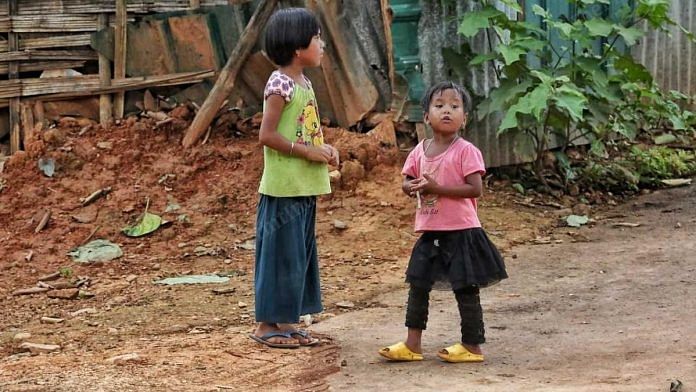Kwatha: “We want peace” — a board hanging from the bamboo gate that leads into Kwatha village, nestled in the serene hills of Khobou in Manipur’s Tengnoupal district, announces.
Surrounded by six Kuki and three Naga villages, Kwatha presents a stark contrast to the rest of Manipur, which is caught in violent clashes between the Kukis, who dominate the Hill districts, and the Meiteis primarily inhabiting the Valley areas.
While the violence that erupted on 3 May has claimed numerous lives and displaced over 50,000 people across Manipur, Kwatha remains an oasis of tranquility.
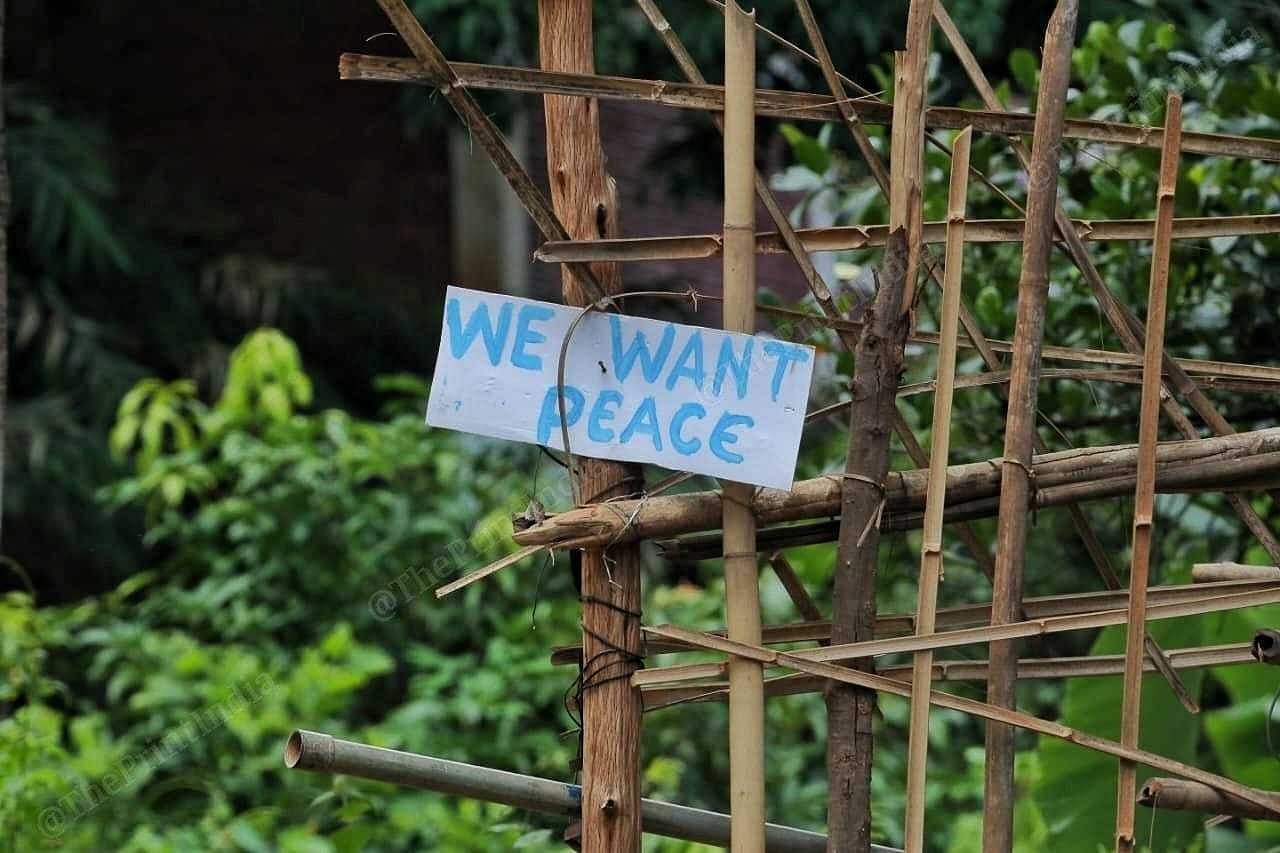
Not a single Meitei has left Kwatha, nor has there been a single clash, making it perhaps the only village in the entire state that has held onto peace.
“We have grown up together and are friends. Some of us even have intermarriages with the Kuki community, so we are not only friends but also relatives with shared customs,” said T. Sanjay Singh, the secretary of Kwatha. “Despite (Meiteis) being a minority here, the Kukis have never treated us as outsiders.”
When violence first began in Manipur on 3 May, many from Kwatha — which has a population of 302 people and 103 houses — thought of leaving for the Valley areas.
But when the Kukis from surrounding villages assured them of their safety, the Meiteis decided against it, say Kwatha residents.
“Our relatives in the Valley kept calling us, informing us about the destruction and the possibility of our houses being attacked by the Kukis, who constitute a majority here,” said Singh.
“They warned us that our village could be razed to the ground, and it did instill fear in some families who considered running away. But eventually, we chose to stay.”
He added, “The Kukis from neighboring villages approached us, and, through several meetings, they assured us that no harm would come to us.”

The presence of an Assam Rifles unit in the area played a vital role in maintaining peace. They conducted solidarity meetings and flag marches, actively working to prevent any clashes.
“It is heartening to see that the Kuki community has unanimously pledged to safeguard Meiteis to ensure peace in the area,” Raj Kishore, Deputy Commandant, Assam Rifles, told ThePrint.
“This Meitei village, surrounded by Kuki settlements, has remained peaceful. The villages have made an oral agreement, and they stand firmly by it,” Kishore said.
Some Meitei residents said a sense of fear remains — talking about tense conversations around prickly subjects such as who started the violence — but added that efforts are being made on both sides to sidestep such conversations in the larger interest.
Also Read: Tears, tales of harrowing escape & a few reasons to smile — life at a Kuki relief camp in Manipur
Kukis giving safe passage, arranging rations
In addition to the peace agreement, the Kukis in the area provide a security cover for Meiteis who need to travel to the Imphal valley for essential items or medical treatment, Kishore said.
When Meiteis from Kwatha need to travel to the Imphal valley, they must pass through many Kuki settlements. To ensure their safety and prevent any potential attacks or obstacles along the way, Kukis from the 6 settlements accompany them until Tengnoupal or even Pallel, a junction connecting three districts — Kakching, Chandel, and Tengnoupal — at the foothills.
Beyond this point, the Meitei-dominated districts of the Valley begin.
“Many times, people from Kwatha need to go to the Imphal valley to purchase medicines, essential items, or visit the main hospital for tests or treatment,” said Jimmie, a Kuki resident of Khudenthabi village in the area.
“So, we escort them until Pallel to ensure that nobody from our community hinders or harms them during their journey,” he added.
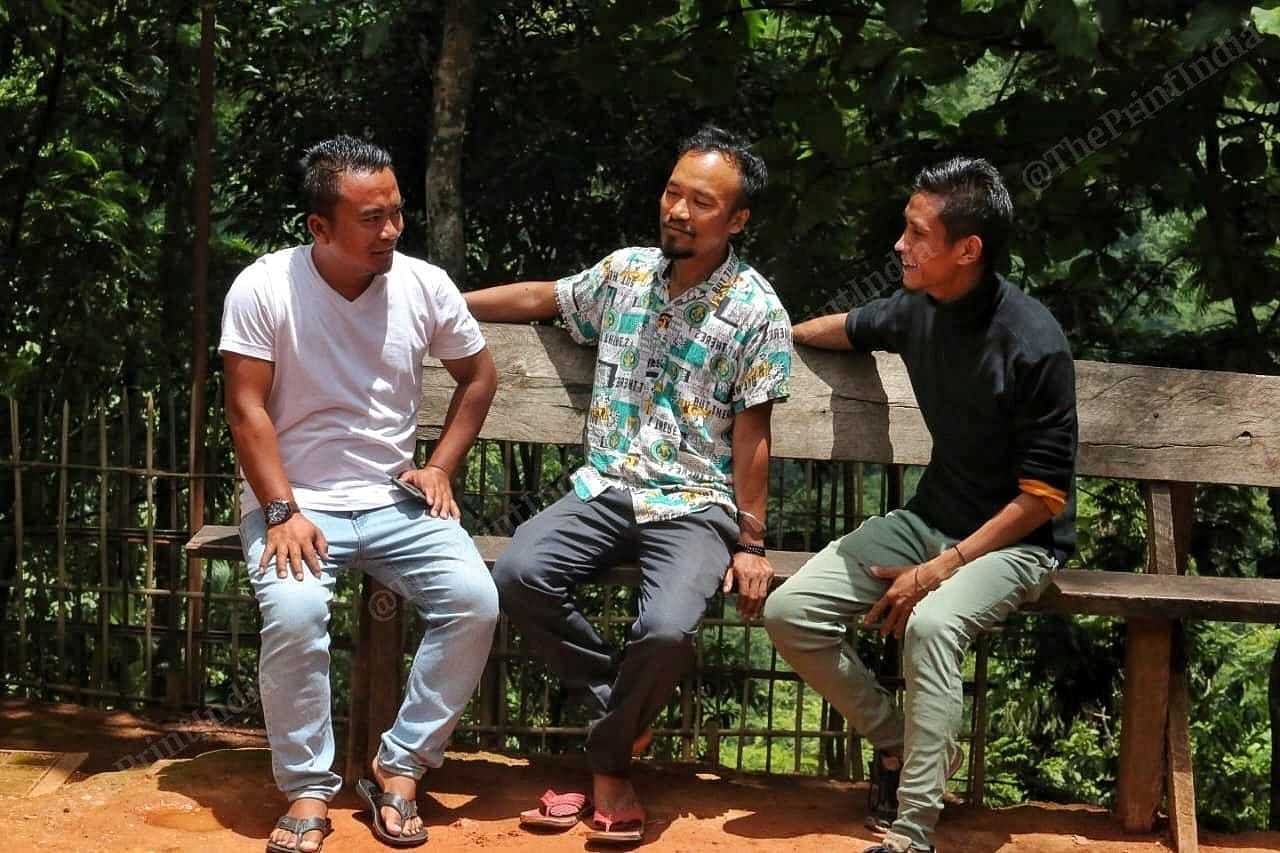
Earlier this month, a pregnant woman from Kwatha village was taken to the Regional Institute of Medical Sciences (RIIMS), Imphal, in a vehicle provided by the Assam Rifles, accompanied by a group of Kukis who ensured her uninterrupted passage until Pallel.
“We ensured that she is not stopped on the way,” Jimmie said.
The Kukis are also assisting the residents of Kwatha with essential supplies such as rations and medicines, which have been inaccessible due to blockades.
“Our civil society groups, the church, and people from neighboring Kuki villages have collectively contributed funds to support them. Since they are nestled between Kuki villages, it becomes our responsibility to ensure their safety and well-being by arranging essential items,” Jimmie said.
The Assam Rifles personnel stationed in the area have been actively involved in ensuring a regular supply of essential items to the village.
“The Assam Rifles has arranged a variety of medicines that were depleted at the local Public Health Centre, including those for diabetes, and sanitary napkins,” said N. Tombichanu, a nurse at the local Public Health Centre in Kwatha.
“They, along with residents from nearby Kuki villages, have been ensuring the provision of ration to our village.”
Tombichanu said the village has “three pregnant women here who need to undergo ultrasound and other tests in Imphal”.
“We have sought assistance from the Assam Rifles, and they are arranging our visits,” she added.
‘700-yr history’ — what binds the two communities
According to local residents, the coexistence of Kukis and Meiteis in the area goes back 700 years.
“Our ancient Meitei village traces back 700 years, a time when Myanmar and India were under the rule of a single king,” said N. Tombichanu.
“Our ancestors, our grandfathers, and great-grandfathers have lived here in harmonious coexistence. People from both communities have grown up together, studied together, celebrated festivals together, and mourned together,” she added. “We are united as one.”
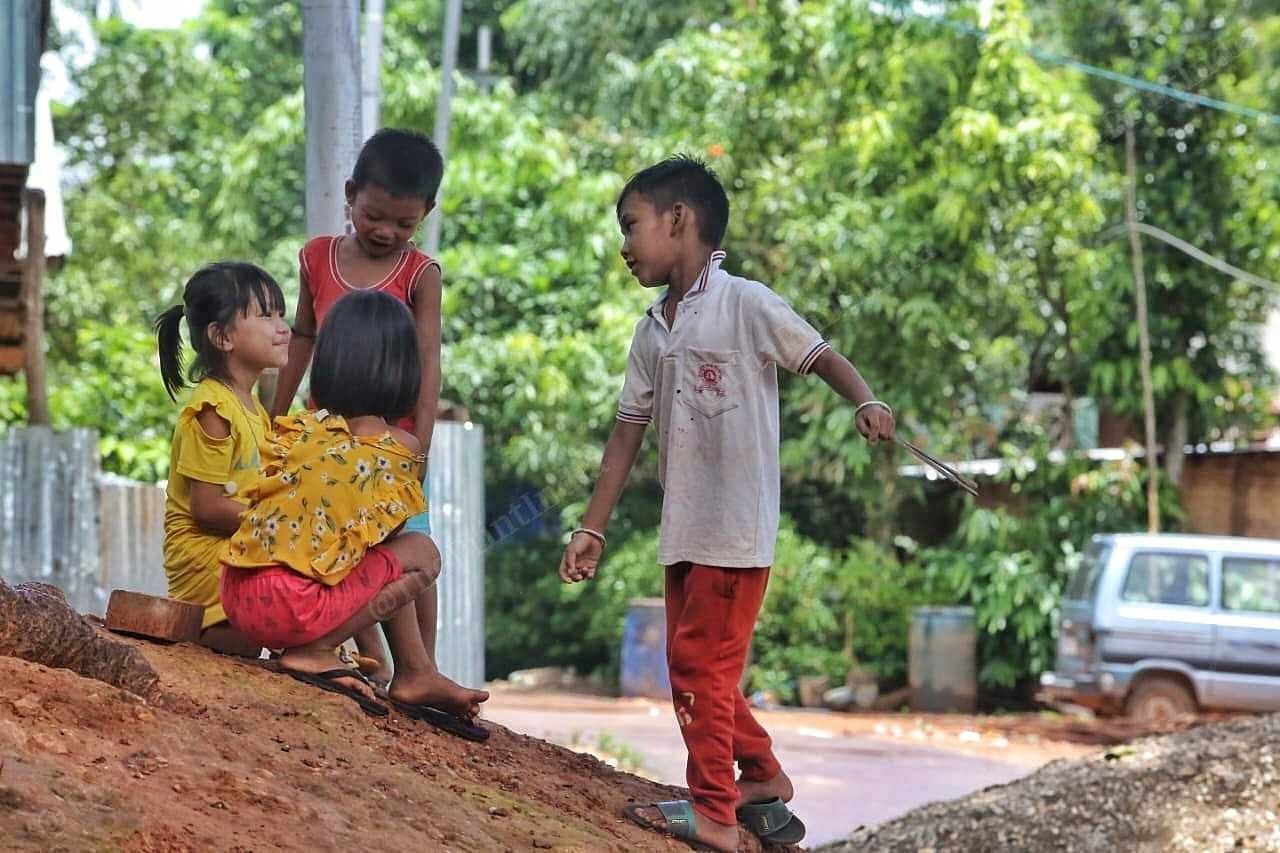
In the face of the ongoing violence, Kwatha conducts regular meetings with neighboring Kuki villages — during these meetings, they delve into the history of the village in a bid to foster an atmosphere of peace, the residents said.
“As incidents of violence escalated, all the village chiefs convened a joint meeting with us, emphasising the shared history and customs that bind us,” said N. Tombichanu. “They reassured us of our safety, and it is because of their assurance that we are still here.”
Jimmie, the Khudenthabi resident, added, “We have lived together for hundreds of years. We believe in the essence of humanity. Despite conflicts, we reject violence because they have not harmed us. Why would we harm them?”
Undercurrent of fear
Despite the reassurances, however, an undercurrent of fear persists among some Meiteis in Kwatha.
“We receive calls from our relatives in the Valley, asking how we are managing to stay safe despite being surrounded by the Kukis,” said Ratna Singh, a resident of Kwatha.
“We assure them that we are secure, but deep down, given the prevailing circumstances, we too experience fear.”
While the leader of the Kukis has provided assurances of safety, there are fears about individual groups within the community launching attacks.
“We have been given assurance by their leader that nothing will happen, but what if a group of them comes and attacks us?” said Singh. “How can one leader take responsibility for the entire community?”
According to Singh, tensions have arisen between the Kukis and the Meiteis of the area during debates surrounding the initial spark of violence.
The Kukis, she said, claim to be defending themselves and deny they initiated aggression. The Meiteis find the statement disconcerting, Singh added.
She cited the destruction experienced by both sides, saying it made it difficult to accept the Kukis’ assertion that the Meiteis were the ones who instigated the violence.
The villagers have now decided to not talk about the topic when they meet, she said.
“This continuous blame game needs to stop. We should not dwell on who started the violence first or who is at fault. That is the decision we have made now,” she added. “Even if someone brings up the topic, we change it. We discuss it within our families but avoid discussing it with them (Kukis). We never know what might trigger them.”
Rani Bala, a teacher who provides private tuitions to children from Meitei as well as Kuki communities at her home, concurred with Ratna Singh.
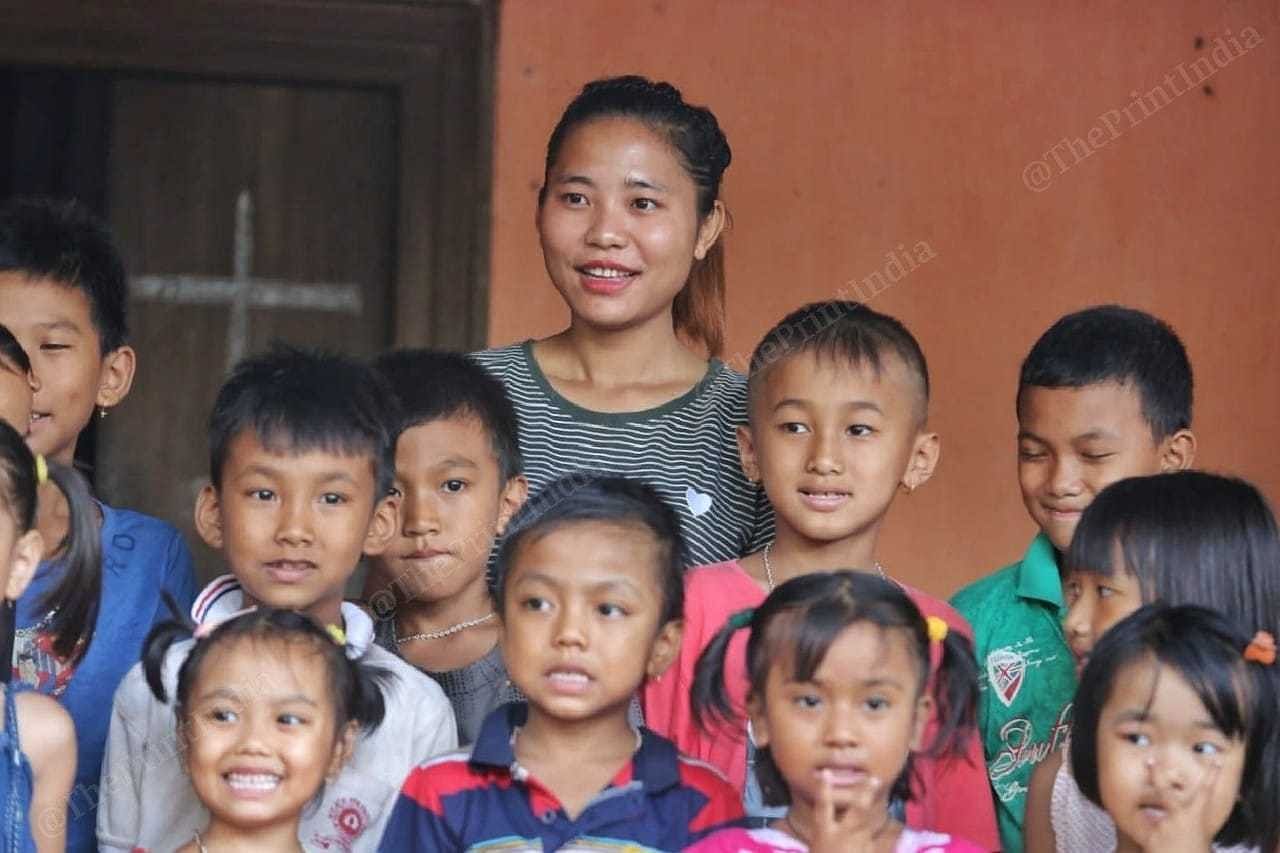
She shared her concerns about explaining the school closures to the children, but expressed gratitude that the Kukis are still sending their children to her for tuitions. She hopes this positive interaction continues and that peace can be restored soon.
“The children ask me why the school is shut, I tell them because of a bandh. What do I tell them?” she said. “They are too young to understand. I am just glad that the Kukis are still sending their children to me. I hope it remains this way and peace is soon achieved.”
(Edited by Sunanda Ranjan)


